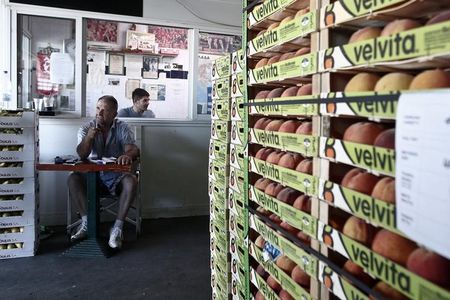By Jan Strupczewski
BRUSSELS (Reuters) - Euro zone inflation slowed again in September as some food and energy prices fell, a first estimate showed, reinforcing expectations the ECB will ease policy further and sending the euro to a two-year low.
Eurostat said on Tuesday that consumer prices in the 18 countries sharing the euro rose 0.3 percent year-on-year, less than the 0.4 percent increases seen in August and July. The September reading was in line with market forecasts.
The European Central Bank wants to keep headline inflation at just under 2 percent over the medium term. Persistently low price growth underscores the difficulty of hitting that target while the euro zone economy continues to stagnate.
The euro sank below $1.26 for the first time since September 2012 after the data, hitting a low of $1.25715 on trading platform EBS and down almost 1 percent on the day.
Euro zone shares rose on expectations the ECB will introduce new stimulus measures to boost the region's flagging economy.
"With actual output below potential and weak wage growth in many euro zone countries, inflation will remain subdued," said Tomas Holinka, economist at Moody's Analytics.
"The euro area economy stalled in the second quarter and the recovery prospects are fading. With tougher sanctions against Russia, risks are weighted to the downside.
"The euro zone's weaker than expected performance fuels uncertainty about economic recovery and fears about the threat of deflation," he added.
Unprocessed food prices fell 0.9 percent year-on-year in September and energy was 2.4 percent cheaper.
What the European Central Bank calls core inflation - a measure stripping out these two volatile components - was 0.8 percent year-on-year, slowing from 0.9 percent in August.
Eurostat initially reported core inflation of 0.7 percent but later revised its figure, citing a rounding error.
To accelerate price growth, the ECB has cut the cost of borrowing to almost zero, offered further cheap loans to banks and pledged to buy repackaged debt. ECB President Mario Draghi has emphasised that it could do even more.
But going for full-blown quantitative easing, by adding government bonds to the ECB's shopping list, would be politically difficult because of stiff opposition in Germany, the euro zone's biggest and most powerful economy.
Draghi is expected to give further details of ECB plans to buy asset-backed securities and covered bonds when the bank's governing council meets in Naples on Thursday. Investors do not expect new policy decisions yet, after the bank cut all three of its main interest rates in early September.
Draghi has, in the meantime, sought to put the ball back in the court of governments, saying that the central bank cannot single-handedly turn around the bloc's economy, and that countries need to make reforms.

The ECB's job may be made easier by a weakening euro, which has broken below its 2013 lows and is down almost 9 percent from the peak it hit against the dollar in May.
(Additional reporting by John O'Donnell in Frankfurt; Editing by Catherine Evans)
